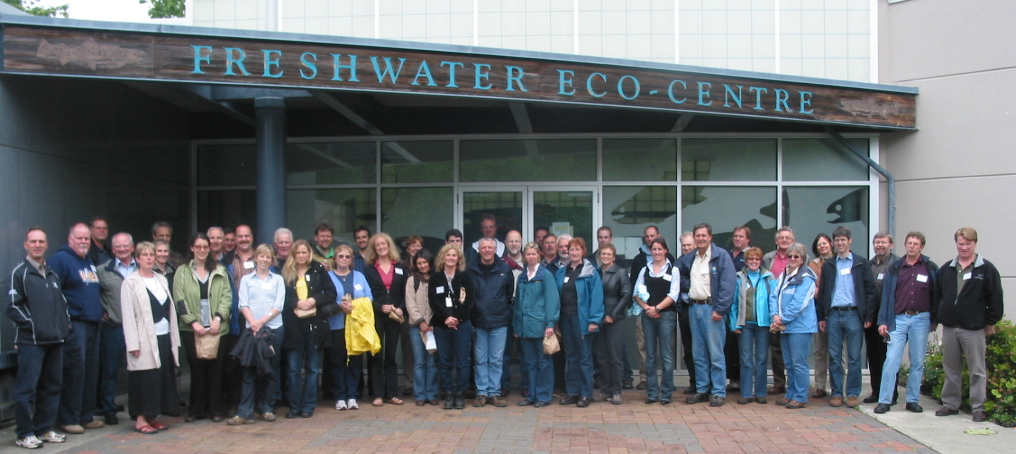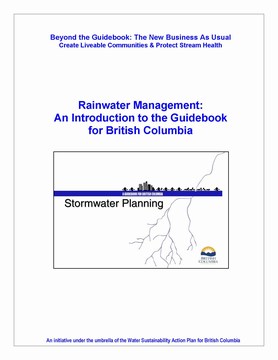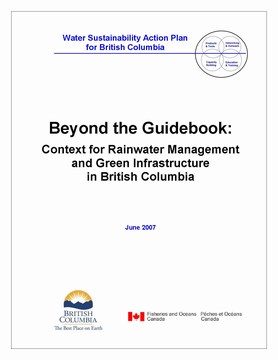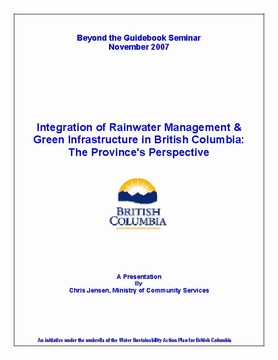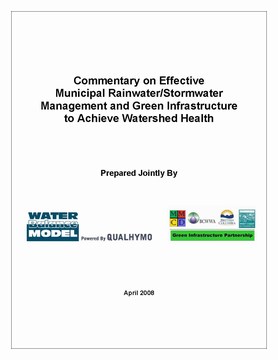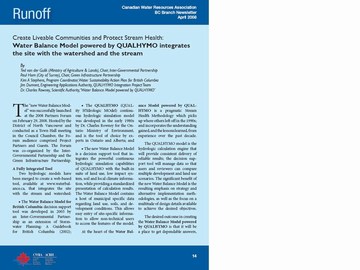Pilot program for “Learning Lunch Seminar Series” launched in the Cowichan Valley: Seminar #1 held on June 6, 2008
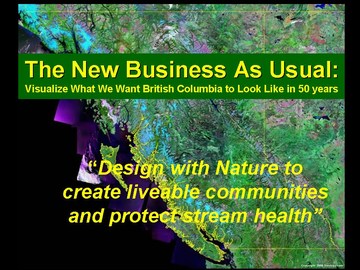
Developing a regional green infrastructure policy framework through an inclusive and collaborative approach
The Learning Lunch Seminar Series is a precedent-setting approach to continuing education for local government practitioners; and the Cowichan Valley Regional District and City of Courtenay are the host local governments for a pilot program that is being delivered under the umbrella of CAVI – Convening for Action on Vancouver Island. In total, the Vancouver Island local governments that will be participating represent some 250,000 people.
The Learning Lunch Seminar Series is the first step in building a regional team approach so that there will be a common understanding and consistent messaging regarding on-the-ground expectations for rainwater management and green infrastructure. This provincial initiative builds on the foundation provided by Stormwater Planning: A Guidebook for British Columbia, published in 2002, and incorporates lessons learned over the past six years in moving from planning to action.
Cowichan Valley Organizing Committee
The Learning Lunch pilot program was launched on June 6, 2008 when the first of three sessions in the Cowichan Valley Series was held at the Freshwater Ecocentre in Duncan. The program was developed by an organizing committee comprising representatives of the Cowichan Valley Regional District (CVRD), District of North Cowichan, and City of Duncan.
“A key to seminar program design is that the organizing committee represents the spectrum of departmental perspectives within local government, namely: environmental planning, engineering, development services, and building inspection,” reports Kim Stephens, team leader and Program Coordinator for the Water Sustainability Action Plan for British Columbia. “We quickly realized that a litmus test for achieving long-term success on-the-ground would be early buy-in from building inspectors in particular.”

Regional Policy Development
Consistent with a unanimous resolution by the Regional Board, Seminar #1 on June 6 was attended by inter-departmental representatives of all five member local governments (i.e. CVRD, North Cowichan, Duncan, Ladysmith and Lake Cowichan). An inter-regional flavour was added through the participation of representatives of two provincial ministries, the Cowichan Tribes, the Regional District of Nanaimo, and the cities of Nanaimo and Courtenay. In total, the first class was attended by 50-plus practitioners.
 According to Kate Miller, Environmental Manager for the Cowichan Valley Regional District, “A message that we are hearing from local government, and certainly from the Province, is the increased expectation for rainwater management. For that reason, we have brought together this inter-governmental group to develop a policy framework for our region. Through the Learning Lunch Seminars, we are hoping to foster a dialogue that will result in adoption of a set of tools for implementing green infrastructure that is based on a rainwater management way-of-thinking.”
According to Kate Miller, Environmental Manager for the Cowichan Valley Regional District, “A message that we are hearing from local government, and certainly from the Province, is the increased expectation for rainwater management. For that reason, we have brought together this inter-governmental group to develop a policy framework for our region. Through the Learning Lunch Seminars, we are hoping to foster a dialogue that will result in adoption of a set of tools for implementing green infrastructure that is based on a rainwater management way-of-thinking.”
Learning Outcomes
The Stormwater Planning Guidebook set in motion a chain of outcomes that has resulted in British Columbia being recognized internationally as a leader in implementing a natural systems approach to rainwater management in the urban environment. To develop a common understanding of what this means in practice, Seminar #1 was structured in three parts, with learning outcomes as identified below.
Part One – The evolution of rainwater/stormwater management over the past decade
To download a  copy of the presentation by Kim Stephens that provides a frame of reference for the entire series, click here. A key message is that it is more effective to reduce risk by being proactive in eliminating the causes in order to prevent problems, rather than in being reactive in dealing with the consequences after problems have occurred.
copy of the presentation by Kim Stephens that provides a frame of reference for the entire series, click here. A key message is that it is more effective to reduce risk by being proactive in eliminating the causes in order to prevent problems, rather than in being reactive in dealing with the consequences after problems have occurred.

To download a copy of the presentation by Chris Jensen of the Ministry of Community Services that summarized the Province’s emerging policy framework to achieve green outcomes, click here. The focus of his presentation was on Bill 27, enacted in June 2008, to help municipalities and regional districts create more compact, sustainable and greener communities.
Part Two – Why a Design with Nature approach to rainwater management will influence the greening of the built environment and protect stream health
To download a copy of the presentation by Dean Mousseau and Gary Noble of the City of Nanaimo, click here. A key message is that the City challenged the developed to do something different, and this has created a chain reaction in terms of the approach being replicated in Courtenay and North Cowichan.
To read previous WaterBucket articles on the Inland Kenworth project, click on the following links to Nanaimo Inland Kenworth dealer wins green acclaim for innovation in site development and Inland Kenworth industrial site in the CIty of Nanaimo establishes ‘design with nature’ precedent.
Part Three – How to use the 2002 Stormwater Planning Guidebook as a planning resource and/or tool
To download a copy of the presentation by Kim Stephens, click here. This describes the decade long journey to develop and implement a science-based approach to rainwater management in BC. A key message is that the Guidebook is outcome-oriented. This sets it apart from output-oriented approaches.
.
“By spreading the curriculum over three sessions, this enables participants to take in new information, reflect on it, blend it with their own experience, test it, and eventually apply it in making decisions,” notes Kim Stephens. For more detailed information on the series design, please click on the following link to download a copy of the Program Outline for Learning Lunch Seminar Series.
City of Duncan Case Study
To ground the Learning Lunch Seminar Series in reality, a 2-lot subdivision in the City of Duncan serves as a case study. According to David Hewetson, the City’s Building Inspector: “This property poses a lot of challenges because: it is in the  floodplain; has been built-up with fill; and is situated right next to a creek. In terms of developing an appropriate solution, and considering the role that each department plays in the process, it comes down to who is dealing with what….when. Until now, it has been death by a thousand cuts. The purpose of the case study is to help us think about what will work for all of us…so that we can show others where we want to go.”
floodplain; has been built-up with fill; and is situated right next to a creek. In terms of developing an appropriate solution, and considering the role that each department plays in the process, it comes down to who is dealing with what….when. Until now, it has been death by a thousand cuts. The purpose of the case study is to help us think about what will work for all of us…so that we can show others where we want to go.”
Seminar #1 included a lunchtime walkabout so that participants would have a picture in their minds of the case study site. To view a short video clip of David Hewetson describing site constraints and opportunities, please click here. The walkabout set the stage for the City of Nanaimo co-presentation by Dean Mousseau and Gary Noble.
Series Overview
 “Each session in the Learning Lunch Seminar Series starts at 11:00am and ends at 2:30pm,” notes Peter Nilsen. “Our experience is that this is the right length of time to maintain the interest and energy level of participants. Three and a half hours sounds like a lot of time, but it goes quickly; and we were just scratching the surface in terms of the material that we presented.” The theme and scope of each session are summarized below:
“Each session in the Learning Lunch Seminar Series starts at 11:00am and ends at 2:30pm,” notes Peter Nilsen. “Our experience is that this is the right length of time to maintain the interest and energy level of participants. Three and a half hours sounds like a lot of time, but it goes quickly; and we were just scratching the surface in terms of the material that we presented.” The theme and scope of each session are summarized below:
- Today’s Expectations are Tomorrow’s Standards:Session #1 traces the evolution of rainwater/stormwater management policies and practices over the past decade. This provides a frame-of-reference and a common understanding for subsequent sessions.
- Legal and Policy Strategies to Support Green Infrastructure: Session #2 introduces the extensive and very specific tools available under the Local Government Act so that they can proactively manage the complete spectrum of rainfall events: from light showers to heavy rain to extreme storms.
- Establishing Watershed Performance Targets: Session #3 introduces a performance target approach to land development that makes sense, meets multiple objectives, is affordable, and results in net environmental benefits at a watershed scale.
“The series comprises three sessions that provide an inter-departmental learning opportunity for collaborative exploration. The series is conducted as a cumulative process, from philosophy to tools,” reports Kate Miller.



PowerPoint Presentations
- Kim Stephens: Building local government capacity
- Chris Jensen: Making the rules serve the goals
- Dean Mousseau & Gary Noble: Inland Kenworth development in Nanaimo
- Kim Stephens: A Guide to the Guidebook and Beyond
Resources
To download copies of resource materials that comprise the curriculum for the Learning Lunch Seminar Series, click on each of the images below:
Video Clip
David Hewetson: City of Duncan walkabout
Posted June 2008


